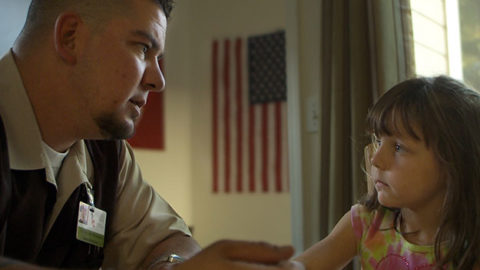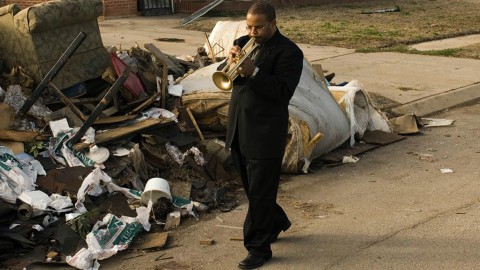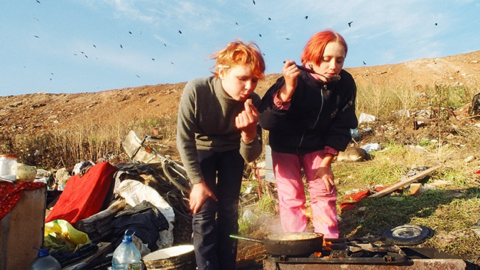Make It Real: On Characters and Democrats
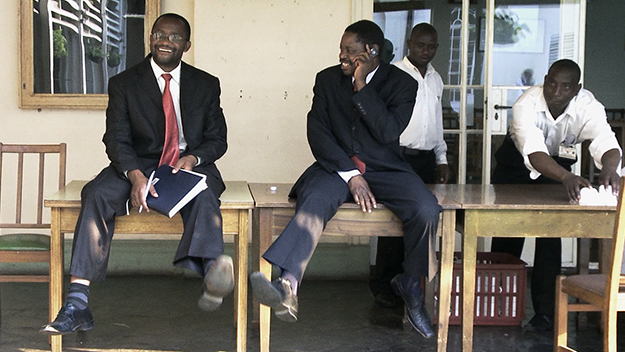
What makes for a good documentary character? Judging from film festival panels and the avalanche of theories, opinions, instructional videos, and listicles that take up this question online, and the examples helpfully provided—hi Morgan Spurlock, hey there R. Crumb, hello again Bob Dylan—you’d be forgiven for thinking that there’s actually an answer to this question.
But why would it be any easier to account for what makes a documentary character good than to reckon what makes a person good? Well, you may say, it is easier to account for the quality of a character than that of a person, and you’d be right. Still, it’s not a particularly satisfying answer in that it concedes a shoulder-shrugging, broadly defined notion of nonfiction artistry as a reductive practice. Certain decisions can be made in the casting and editing to render a character more or less compelling or interesting, but this implies that there are such things as inherently compelling or interesting characterizations. Yet the minute a character conforms to a pattern of expected or collectively valued behavior, isn’t that character… less compelling and interesting?
The same goes for the notion of character motivation, which helps for solving a crime or spinning a mystery yarn, but can be less than useful in nonfiction storytelling. It supports the notion of “if A, then B.” Because, why. In this character-driven approach to nonfiction film, the “why” oftentimes supersedes the “what.” The shape, the arc, makes the mess of the moment more knowable. But why make the mess of the moment any more knowable than what the camera in that moment can make it? This is why, 47 years on, a film like Salesman still feels vital and modern. It’s not that it’s more real or less invasive than other films, it’s that something electric, a still-live current, is created when the curiosity and empathy of the filmmakers is thrust against the stubborn, but never complete, opacity of a person at work, play, or in conversation—and allowed to buzz and pop without its meaning and purpose being overdetermined. And it’s why recent offspring like The Chinese Mayor, which premiered at Sundance last year and hasn’t received the attention it deserves, and Democrats, which opened this week in New York, can feel radical despite this venerable lineage.
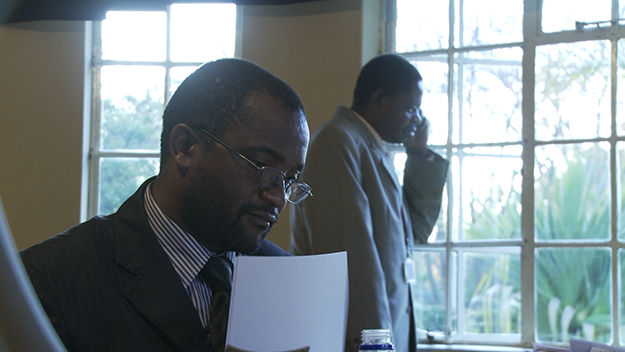
It’s not that there are no characters in Democrats, which chronicles a three-year process of drafting a democratic constitution in Zimbabwe, and was directed by Danish filmmaker Camilla Nielsson. Two characters in fact are the focus of nearly every scene of the film: Paul Mangwana, the perpetually grinning chief negotiator for President Mugabe’s party, ZANU-PF; and the determined, stoic Douglas Mwonzora, chief negotiator for Morgan Tsvangirai’s opposition party, MDC-T. In that respect, the film is “character-driven.” But in most other respects, the handling of these characters runs counter to what’s typical of a character-driven narrative. There’s no clear development of the characters, outside of how ongoing events affect their strategies and anxieties. We aren’t given backstories. We don’t know where they come from, what they’ve done prior, or anything about their personal lives. All that we know is what their current job is, what and who they represent in that job, and how they go about doing those jobs. It’s not that Nielsson forgot or failed to supply us with the rest of the information; rather, she’s determined that it’s not what’s important to her film. Hers is not the only right choice, but her choice does hold significant meaning.
Just as Democrats depends on characters without being character-driven in the traditional sense, it doesn’t quite eschew the tactic of telling a larger story via a personal one, because the viewer is indeed granted these two men as conduits to the national situation. Yet the movie doesn’t elect to make their stories the story, and doesn’t insist on making them metaphors for that story either. Mangwana may operate with Mugabe’s impunity, but his self-awareness of that impunity, and of the inequality of the fight—expressed through a series of startlingly frank monologues from the driver’s seat of his car—makes him ill-fitting as a representative symbol. Instead, Nielsson asserts that the struggle to author a fair, democratic, and humane constitution for a populace that’s long operated without one is plenty compelling enough. The stakes are sufficiently high without having to persuade the audience of those stakes. In fact, overly personalizing the conflict would risk diminishing the stakes to the level of a personality dispute. Many films take this tack, and some do so for an honest purpose. A contrived narrative is often put in the service of a greater, subtler one. But the gambit can risk eclipsing that larger narrative, and giving unique circumstances familiar packaging. We’re led to feel, and to relate, but that doesn’t always translate to understanding. Or to distinguishing what’s particular about the moment being glimpsed from our coaxed experience of it.
It’s not as if Democrats lacks drama, or that it takes place entirely in conference rooms (though the final section does take place in conference rooms, and it’s wildly suspenseful). The film begins with each man traveling around the country to poll citizens about what they want the constitution to include and stipulate, and it unfolds like a prolonged and bitter military battle. Mwonzora arrives at a small village to discover that the Mangwana has preceded him and poisoned the well, coaching the people on what to say (basically, that Mugabe should make all decisions now and forever). Mangwana arrives at a public discussion to discover people revolting against the process, and has to slip away while the crowd violently rocks his SUV. The Mugabe camp busses rural backers into the city to overwhelm and subvert caucuses, which Mwonzora takes to the press. Then when the two rivals start negotiating on the language of the constitution, Mwonzora is suddenly arrested and removed from the process so that Mangwana can ride roughshod over oppositional demands. The audience is told that the charges against the opposition’s representative are trumped up and outdated, but never learns exactly what they are. The implication is that to dwell on those details would legitimize them, since it’s clear the timing of the arrest was meant to obstruct the process.
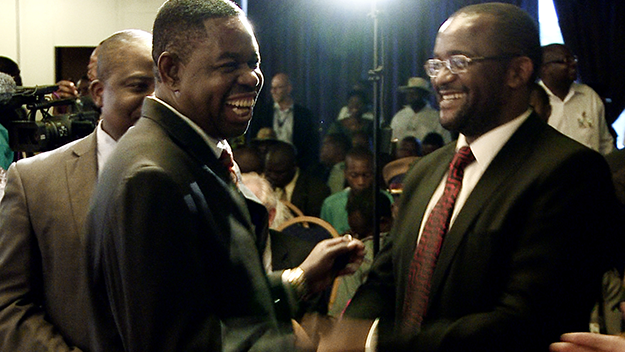
It’s a dramatic, complicating turn, but within Nielsson’s film, only addressed in terms of how it affects the writing of the constitution. The director’s dedication to what she sees as the important story here is total, moral, and in a sense, thrilling. Not all complications are built alike, and there’s little actual value in “complications” as an object in itself. Another filmmaker might find a way of finessing the information into the film without derailing the narrative, but Nielsson’s approach emphasizes her commitment to telling the story of the crafting of this constitution, full stop. What’s missing from the film is a testament to the importance of what’s there.
The film often plays like an absurdist comedy, and Nielsson’s in-the-moment approach calls to mind David Mamet’s theories of acting, which devalue textual interpretation, psychological explanations, and character-driven storytelling. For Mamet, plot is what matters, and it’s the action that defines characters rather than whatever’s going through their heads as they perform or are subject to the actions. Yet there’s no commensurate plotting in Democrats, no strict hand that limits what’s said or known at any given moment—just an immensely important process that deserves our attention. And there’s plenty to observe in the behaviors and actions of both men to make you curious to know them better, and wonder what they might have been like before the film, and what they might become after their jobs here are done. It’s okay to wonder. Being left to wonder isn’t a failing of the film. On the contrary, this way I know I don’t know the half of it, rather than walking away with the false impression that I do.
By the end, it becomes painfully clear that neither Mangwana nor Mwonzora matter all that much within the context Mugabe’s continued reign. The process that we’ve been observing, and that they’ve dedicated themselves to, and that the film and filmmaker have affixed themselves to for three years, is largely a charade. That there doesn’t seem to have been a point, or effect, is in effect the point. Maybe the constitution will make a difference to future generations off Zimbabwe citizens, but for now Mugabe is ignoring its tenets—because he can. “I’m in the system,” Mangwana says at one point, asserting his place of power over Mwonzora, a man he clearly respects. “And I know how lethal it is.” It’s possible that in the years after the drafting of the constitution, both Mangwana and Mwonzora have made peace with what happened, have incorporated it into the larger stories of their lives. Another film might have given us a taste of this as a parting shot, a “life goes on” epilogue. But that’s not Nielsson’s story. And it’s not the story of the failed democratic process in Zimbabwe. It’s only by focusing on the process that we can understand the tragedy of its failure. The correlative isn’t Mamet, of course. It’s Beckett. And it’s important that the Vladimir and Estragon that meet in the beginning are the Vladimir and Estragon we leave in the end. They’re not built on backstories and progress. It’s the waiting that defines them.



